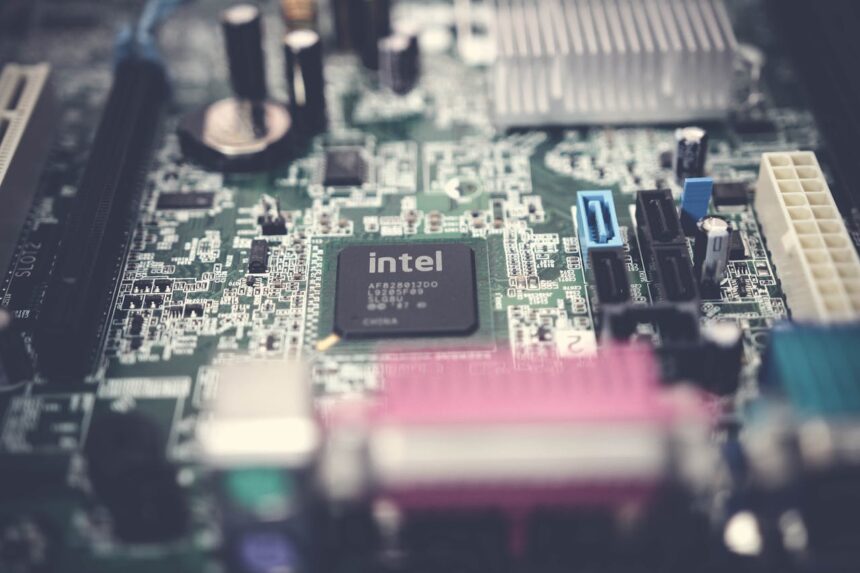Selecting the right processor for your PC can feel like navigating a maze. With so many brands and models out there, figuring out the best fit for your needs might seem tough. But don’t worry! In this article, we’re diving into two popular options: the ryzen 9 7845hx vs i7-13700hx. We’ll break down their features, performance, and price to help you make a choice you feel good about.
Related topic: Comparison of i9-13900h vs 7940hs Graphics, Processor and Pricing
Ryzen 9 7845HX
Let’s start with the Ryzen 9 7845HX. Crafted by AMD and part of the impressive Zen 3 family, this high-end processor hit the shelves in early 2021. It boasts 8 cores and 16 threads, humming away with a base clock speed of 3.2GHz that can boost up to 4.6GHz. Plus, with 20MB of cache memory and support for PCIe Gen 4.0, it promises swifter data transfer speeds.
Features
The Ryzen 9 7845HX is built on AMD’s latest architecture, which boasts a 19% increase in instructions per clock (IPC) compared to its previous generation. It also has an improved thermal design, allowing for better heat dissipation and thus higher overclocking potential. Additionally, this processor has a TDP (thermal design power) of 45W, making it more energy-efficient than its predecessors.
Performance
The Ryzen 9 7845HX offers impressive performance in both single-core and multi-core tasks. In benchmark tests, it outperforms its closest competitor, the i7-13700HX, in terms of multi-threaded performance. This is due to its increased core count and faster clock speeds. It also excels in gaming, thanks to its boost clock speed and support for PCIe Gen 4.0, resulting in smoother gameplay and faster load times.
Price
The Ryzen 9 7845HX is priced competitively compared to other high-end processors on the market. While it may be slightly more expensive than its Intel counterpart, the i7-13700HX, it offers better value for money with its improved performance and energy efficiency.
i7-13700HX
Meet the i7-13700HX, Intel’s top-notch processor! It’s a shining star in the 11th generation of Intel Core processors family, making its grand debut in early 2021. This powerhouse sports 8 cores and 16 threads, buzzing along at a base clock speed of 2.9GHz that can turbo boost up to a whopping 4.8GHz. Plus, it’s packed with a generous 20MB of cache memory and is all set to rock with PCIe Gen 4.0 support.
Features
Crafted using Intel’s 10nm SuperFin process, the i7-13700HX promises not just great performance but also top-notch efficiency. Its cool, updated thermal design means it can handle the heat, keeping things cool to let those clock speeds soar. Plus, with Intel’s Turbo Boost Max Technology 3.0 in its corner, it smartly cranks up the speed of the fastest core to give you even better performance.
Performance
The i7-13700HX offers excellent single-core performance and is slightly ahead of the Ryzen 9 7845HX in benchmark tests. However, it falls behind in multi-threaded tasks due to its lower core count. It also offers good gaming performance, but it lags behind the Ryzen 9 7845HX due to its lower boost clock speed and lack of support for PCIe Gen 4.0.
Price
The i7-13700HX is priced slightly lower than the Ryzen 9 7845HX, making it a more budget-friendly option. However, considering its slightly lower performance and lack of support for PCIe Gen 4.0, the Ryzen 9 7845HX may offer better value for money in the long run.
Power Consumption and Efficiency
Let’s dive into the ryzen 9 7845hx vs i7-13700hx to see which one might be the best fit for you, especially if you’re all about saving energy or working in places where you can’t always plug in.
Starting with the Ryzen 9 7845HX, its 45W TDP (Thermal Design Power) really shows AMD’s dedication to keeping things energy efficient. This processor is pretty smart about using just the right amount of power to give you great performance without wasting energy. It’s all about getting the most bang for your buck (or watt!), thanks to AMD’s clever engineering that focuses on both saving power and keeping things speedy.
Then, there’s the i7-13700HX from Intel, playing in the same power league, which shows Intel is also in the game of balancing high performance with energy efficiency. The 10nm SuperFin tech behind this chip is Intel’s secret sauce for making it perform well without guzzling power. Intel’s proud of how this process makes their chip a strong performer, especially when it comes to getting more done with every watt.
But when you put them head to head, the AMD Ryzen 9 7845HX often noses ahead slightly, especially when you’re running lots of tasks at once. Its better use of cores means you get more done without pulling more power. The Zen 3 architecture, along with some smart tech to boost its performance, gives it that slight edge in being more energy efficient.
Intel’s i7-13700HX isn’t far behind, though. It has its moments, particularly in tasks that don’t need as many cores, where it can leap ahead in performance for each watt, thanks to its knack for cranking up the speed on a few cores.
Both the ryzen 9 7845hx vs i7-13700hx are showing us the future of chips that don’t compromise on performance to save on power, highlighting the tech world’s bigger move towards gadgets that are kinder to our electrical bills. When deciding between them, think about what you’re going to use them for, as the slight differences in how they use power could affect your computer’s performance, how hot it gets, and how happy you are with it in the long run.
Upgrade Options for Users
When deciding between upgrading to the Ryzen 9 7845HX and the i7-13700HX, it really comes down to what you’re looking for, your personal preferences, and thinking about what’s going to serve you best in the long run. If you’re someone who loves getting the most out of multi-threaded performance and values energy efficiency, then the Ryzen 9 7845HX is going to be your best buddy. It’s not just about being fast; it’s also future-ready with PCIe Gen 4.0 support, making it perfect for those who are into content creation, love gaming, or just have a ton of stuff going on at once.
On the flip side, if your focus is on getting the best single-threaded performance for specific games or apps that rely heavily on one core, the i7-13700HX might just be what you’re looking for. Plus, it’s a bit kinder to your wallet and still packs a punch without making you sacrifice the modern bells and whistles.
Both options are pretty solid when it comes to using energy more efficiently and keeping things cool, which is great news if you’re thinking about upgrading from an older model. You’ll see a nice boost in how much performance you’re getting for the power you’re putting in, and your system will run cooler, too. All in all, the AMD Ryzen 9 7845HX tends to be the go-to for those who want a great mix of power, future readiness, and efficiency. But, don’t count out the i7-13700HX – it’s still a strong choice, particularly if you’re looking to maximize turbo boost features.
Conclusion
So, when we pit the AMD Ryzen 9 7845HX against the Intel Core i7-13700HX, it’s clear that both CPUs are pretty impressive and can meet a wide variety of computing needs. The Ryzen 9 7845HX takes the lead when it comes to multi-threaded performance and being easy on the power, making it a top pick for those of us who need to juggle lots of tasks at once and are looking for a bit of future-proofing with PCIe Gen 4.0 support. Meanwhile, the Intel i7-13700HX is the go-to for anyone needing top-notch single-threaded performance, like gamers or folks using apps that rely on just one core. Plus, it’s a bit more comfortable on the wallet without cutting corners on performance or missing out on cool features. Choosing between these two tech titans really comes down to what you need, how you plan to use your computer, and what you see yourself doing down the road.
Frequently Asked Questions (FAQS)
What’s the deal with PCIe Gen 4.0, and why should I care?
PCIe Gen 4.0 is all about doubling the bandwidth you get with PCIe Gen 3.0, meaning data zips around twice as fast. This is a big deal for anyone using high-speed storage, like NVMe SSDs, or the latest graphics cards, as it helps make sure these components can perform at their best without any bottlenecks.
Can I just pop the Ryzen 9 7845HX into my current motherboard?
It all depends on your motherboard’s chipset and socket type. The Ryzen 9 7845HX needs a motherboard with an AM5 socket. You might also need to update your BIOS. Always double-check with your motherboard’s maker to see if they’re compatible before you go for an upgrade.
How does single-threaded differ from multi-threaded performance?
Single-threaded performance is about how a CPU handles tasks that run on just one core. Multi-threaded performance, on the other hand, is how the CPU deals with tasks that are spread out over several cores. Single-threaded is key for older apps or games that don’t use more than one core, while multi-threaded gets more play in modern apps, content creation, and when you’re multitasking like a pro.
Will upgrading to these processors make my games run better?
Yep, both CPUs can give your gaming setup a nice boost, especially if you’re moving on from an older model. The i7-13700HX shines in games that need strong CPU performance from a single core. But the Ryzen 9 7845HX offers a well-rounded upgrade for a gaming future that’s looking to use more cores more effectively, plus it supports PCIe Gen 4.0 for the latest in gaming tech.
Is jumping to the ryzen 9 7845hx vs i7-13700hx from an older CPU worth it?
Upgrading can really shake things up in terms of speed, handling multiple tasks, saving power, and being ready for what’s coming next in tech. If your current CPU is getting a bit long in the tooth, moving to one of these newer models could be a game-changer. Whether it’s the right move depends on what you’re doing with your PC and if these new CPUs have the features that match your needs. Both the Ryzen 9 7845HX and the i7-13700HX offer a nice step up from older models, but the best choice for you depends on your specific situation and how you use your computer.



